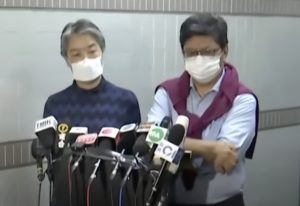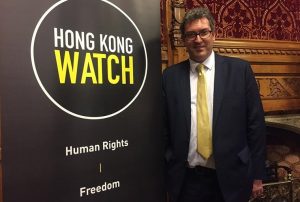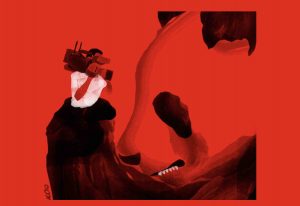London – July 1 is the 25th anniversary of the ceding of the former British colony of Hong Kong to China, but the island’s independent journalism has never been more threatened. The warning comes from Reporters Without Borders (RSF), which has been closely monitoring the media situation in the region for the past quarter century.
Hong Kong is celebrating this date with a series of official events, with the participation of Chinese President Xi Jinping, on his first trip abroad after two and a half years due to its “zero tolerance” policy against covid-19.
But even the festivities couldn’t hide the growing pressure on journalists and media professionals in the region. At least 10 local and international correspondents, including from the Chinese state press, Accreditations denied “for safety reasons”According to the Hong Kong Foreign Correspondents Association.
China briefly respected free journalism in Hong Kong
According to the 1997 Sino-British Joint Statement, Hong Kong will be governed autonomously by 2047 on the basis of a “mini-constitution” called the Basic Law, under the principle of “one country, two systems”.
In this way, the Chinese socialist economy cannot be included in the island, which maintains the capitalist system that was in place for another 25 years under British rule.
“Hong Kong has been reborn from its ashes” in these 25 years, Chinese President Xi Jinping said in his initial statements during his visit to Hong Kong that began on Thursday.
During the leader’s last visit to the region in 2017, the city was experiencing a period of intense turmoil, drawn by violent protests that were widely documented by the local and international media.
Both protests and free broadcasting of events in the region are a thing of the past. Within the scope of the National Security Law enacted in 2020, dDozens of defenders, pro-democracy politicians and journalists were arrested and convicted.
The Chinese president’s commitments in Hong Kong include the inauguration of new local government head John Lee, a former police officer and former security minister.
Hong Kong is a major global financial center and maintains economic and cultural ties with Great Britain.
London does not hide its dissatisfaction with the new directions. Prime Minister Boris Johnson said yesterday that the UK will “not give up on Hong Kong”, but in practice there is nothing concrete that can be done to change the situation, other than diplomatic pressure or sanctions that shouldn’t bother the country so much. strong China.
Opposition to freedom of the press
For the first two decades after the transfer, Reporters Without Borders claims press freedom was “generally respected” in Hong Kong, despite Beijing taking control of some Chinese media and exerting indirect pressure through advertisers.“
During the pro-democracy “Umbrella Movement” in 2014, the police and pro-Beijing supporters on the island became the first target of violence against journalists.
Five years later, the violence intensified during demonstrations of the “anti-extradition” bill, and hundreds of journalists fell victim to police brutality.
The situation worsened further with the passage of the National Security Law in June 2020, which punishes crimes of “terrorism”, “separatism”, “destruction” and “collision with foreign powers”, including journalists, with life imprisonment. main targets.
Hong Kong’s journalism and press freedom, once the benchmark for the rest of Asia, is collapsing, Reporters Without Borders reports.
RSF points out that last year the government governing the region shut down two independent channels, Apple Daily and Stand News. In January of this year, the online newspaper Citizen News became the third newspaper to have to shut down operations in six months.
Read more
Chinese edition leads to closure of third newspaper in Hong Kong within six months
At least 20 journalists and press freedom defenders face lawsuits in the former British colony. Thirteen people are still in custody, including Jimmy Lai, the founder of Apple Daily, according to the French organization.
“The Hong Kong government has waged an unprecedented campaign against independent journalism, completely ignoring the region’s Basic Law, which protects the principle of freedom of the press,” says Cédric Alviani, chief of RSF East Asia.
It calls on world democracies to increase “pressure to end its authoritarian policies on the Beijing regime and restore full press freedom in Hong Kong”.
Read more
Hong Kong’s free journalism ‘undermined’ by pro-Beijing state media, report condemns
‘Big Leap Back’
In a report titled “The Great Leap Back in Journalism in China” published in December 2021, RSF revealed the censorship and information control system established by the Chinese regime in the mainland and Hong Kong, and how it poses a global threat. Press freedom and commitment to democracy.
In the document, the organization emphasized heavily on the regime’s tools of repression against journalists and the deterioration of press freedom in Hong Kong, which was once a model of press freedom but is now a growing number of journalists imprisoned in the name of national security.
Like the RSF, other journalism advocacy organizations such as the International Federation of Journalists and the Center for the Protection of Journalists have been sensitive to reporting violations, but the Chinese government doesn’t seem to mind international criticism.
“If China continues its frenzied retrograde race, the citizens of China may lose hope of seeing the freedom of the press established in their country, and the Beijing regime may succeed in imposing its anti-pattern at home and abroad,” said the RSF Secretary-General. Christophe Deloire.
It calls on democracies to “determinate all appropriate strategies to deter the Beijing regime from pursuing oppressive policies, and to support all Chinese citizens who love their country and want to defend their right to information.”
Read more
Press freedom ‘bounces back’ in China: Report shows scale of censorship and repression
Law restricted Hong Kong journalism two years ago
Hong Kong, once a bastion of press freedom, fell from 80th to 148th last year. RSF World Press Freedom Index 2022.
The People’s Republic of China, on the other hand, ranks 175th among 180 countries and regions evaluated.
In the organization’s analysis of Hong Kong, the National Security Act is cited as the main setback for the island’s journalism:
“Hong Kong’s Basic Law enshrines ‘freedom of expression, press and publication’.
But the National Security Act serves as an excuse to silence independent voices.
Because of their vague wording, the law appears to apply to all journalists covering Hong Kong, regardless of their location.”
The business highlights that journalists in Hong Kong are divided into two groups: those working for local Chinese-language media and those working for English-language or international media.
“Journalists working for independent or pro-democracy media are generally viewed highly by the public, while those working for pro-Beijing newspapers or TV stations are viewed more negatively.”
Regarding the safety of media workers, RSF notes that Hong Kong was a very safe place for journalists until 2014, when those who covered the Umbrella Movement were targeted by police and pro-Beijing groups.
From then on, the scenario only got worse. With the arrest of the 2021 protests, China remains the world’s most imprisoned country for journalists 5 years in a row: 127 people were behind bars on 1 December.
The number of journalists arrested in mainland China fell slightly last year, while detentions in Hong Kong contributed to an overall increase of 2%, according to the prison census, also organized by RSF.
read it too
source: Noticias
[author_name]


